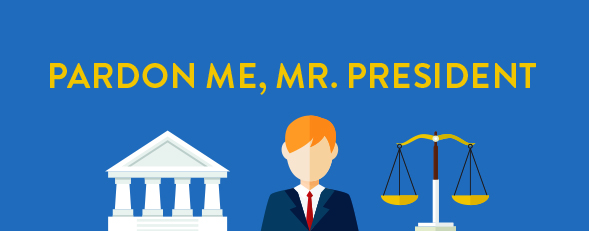
President Trump, once again, is in the news. And there are those claiming he, once again, did an impeachable offense.
So, what was this high crime? Well, he pardoned a six-time re-elected octogenarian sheriff from southern Arizona. I mean, what Sherriff Arpaio did was way worse than the guys that were pardoned last year. They were only guys behind over 100 bombings in major American cities in the 70’s or gave WikiLeaks close to 750,000 classified documents. Arpaio, well, he ignored a judge who told him to stop doing his job. That he was elected to do. By the people of Maricopa County.
But how did presidents get this power of the pardon? It seems very “monarchial”, an idea that is very antithetical to American republicanism. After all, we were the first country to ever tell a ruling king to take a hike; not installing another king in his place.
Well, this power goes back to the to what took place after the Articles of Confederation fell apart. A convention in Philadelphia was initially convened to fix issues with the Articles of Confederation (the document that loosely held the 13 Colonies together during and immediately after the American Revolution). Instead, the convention delegates chose to scrap the entire thing and start over, and wrote a governmental organizational document of pure genius. What went in this new “Constitution” may have been decided in Philadelphia, but it was in many of the leading newspapers and leaflets of the day where, writing under pseudonyms, the ideas were not only hammered out, but also were to influence the population of this new experiment of self-governance. These writings have become known as the Federalist and Anti-Federalist Papers.
Both sides distrusted large, far away government. It came down to how much is “just enough” to keep the country strong while providing the security of private property and liberty. The Federalists, similar to today’s conservatives, were ok with some functions of the civil society to be managed by a centralized government, while the Anti-Federalists, a bit like todays libertarians, were so fearful of a return to monarchs and tyranny that they wanted almost all power to reside in the states. Hamilton, John Adams, John Jay, were some of the former, Patrick Henry, Samuel Adams, James Monroe, and George Mason were some of the latter. (Though the federalists won, the Anti-Federalists are responsible for the Bill of Rights – the first ten amendments to the Constitution.)
Because of these arguments, what was left was a federalized government broken into three separate and equal branches that had checks and balances on each other throughout. Except for the plenary powers, which are powers that are specifically given to a branch (or part thereof), and are absolute, with no limitations or review from another branch. Congress has the “Power of the Purse”, while the pardon is given to the president.
The reason the Federalists wanted pardons at all, as Publius (one of those pseudonyms used, here it was Alexander Hamilton) wrote, that without a pardon “justice would wear a countenance too sanguinary and cruel.” That the courts, without a check over their rulings, can also turn tyrannical. But the main reason this was to become a presidential plenary power was because they felt that if there was mass insurrection, in order to make the country one again, peace would need to be made, and clemency granted to those that had been in open rebellion.
The Anti-Federalists believed this was a power that was akin to kings and was ripe for abuse. They wanted the pardons to be checked by the Senate, just like certain presidential appointments (i.e. cabinet members, Supreme Court justices, and ambassadorships). The Federalists feared that if this was to be the process, pardoning would take too long. The reason: only “a welltimed offer of pardon to the insurgents or rebels may restore the tranquillity of the commonwealth.”
The Federalists were right, not five years later, as President Washington would pardon members of the Whiskey Rebellion. President Lincoln would use it to pardon those who fought for the South, especially the high-ranking officers.
But so were the Anti-Federalists. Pardons, especially in the last half century, have been used for all sorts of reason other than miscarriages of justice (and rebellion).
One in recent history that was used to try to heal the nation was when President Ford pardoned President Richard Nixon. But, as they say, no good deed goes unpunished, and the pardon was seen by the nation as wrong. So, they used their power to check and balance. They voted Ford out of office.
So, while the presidential pardon may be plenary, the people have the power.
(This past September 17th was the 230th anniversary of the signing of the US Constitution.)
You must be logged in to post a comment.